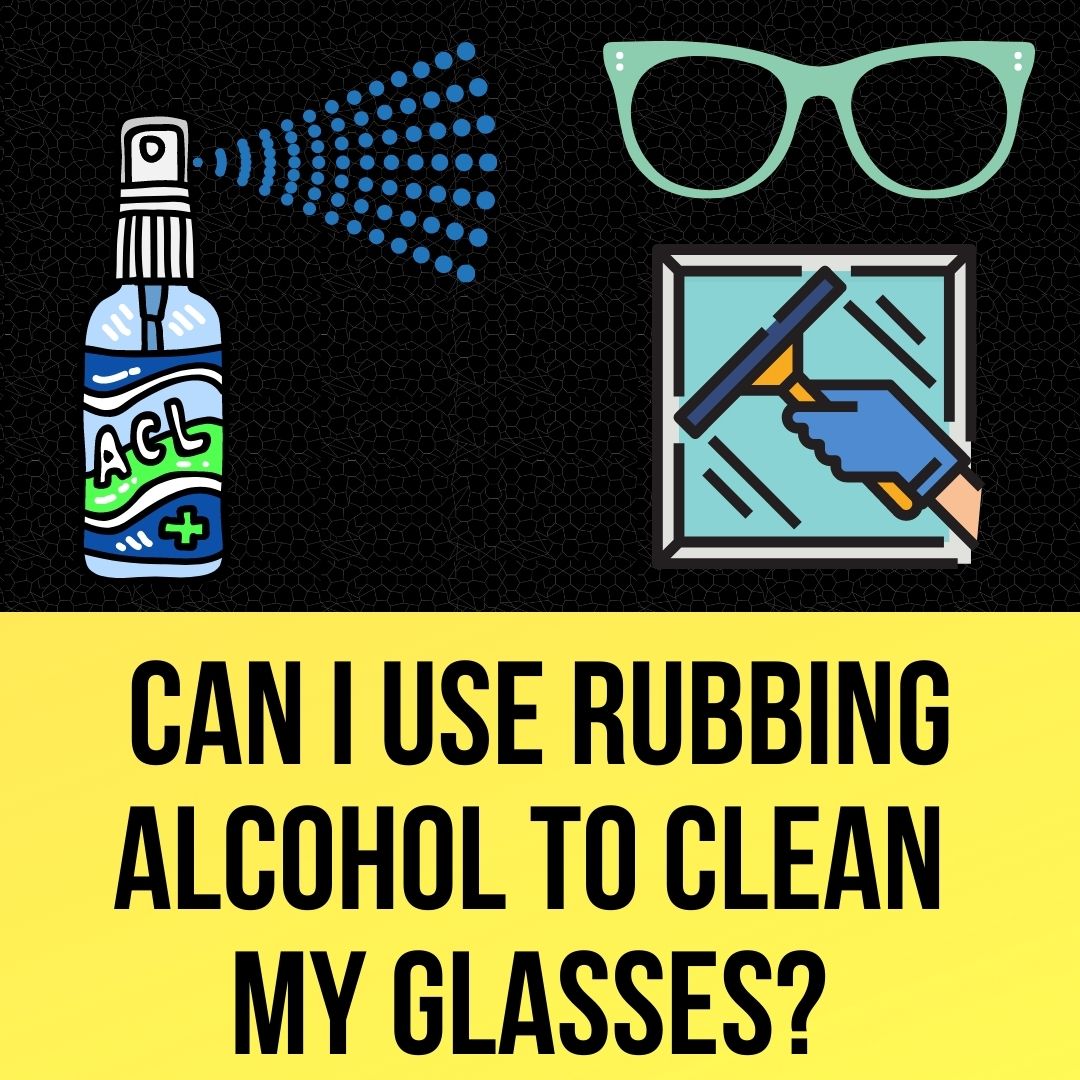
The Pros and Cons of Using Rubbing Alcohol to Clean Your Glasses
Yes, you can use rubbing alcohol to clean your glasses. It’s an effective way to remove smudges, fingerprints, and other residues from the lenses. Clean, clear vision is essential for our daily activities, and maintaining the cleanliness of our eyeglasses is crucial to achieving this. When it comes to choosing a cleaning solution, many people wonder if rubbing alcohol is a suitable option. In this article, we will explore the pros and cons of using rubbing alcohol to clean your glasses, addressing factors such as effectiveness, potential damage, and alternative cleaning methods.
Pros of Using Rubbing Alcohol:
- Effective Grease and Grime Removal: Rubbing alcohol, or isopropyl alcohol, is known for its excellent ability to cut through grease and grime. When applied to glasses, it can effectively dissolve oils from your skin, fingerprints, and other residues that may accumulate on the lenses.
- Quick Drying: One of the advantages of rubbing alcohol is its fast evaporation rate. This means that when you clean your glasses with rubbing alcohol, they are likely to dry quickly, leaving minimal streaks behind.
- Affordability and Accessibility: Rubbing alcohol is a common household item found in most medicine cabinets or first aid kits. Its affordability and widespread availability make it a convenient option for cleaning glasses without the need for specialized eyeglass cleaning solutions.
- Disinfectant Properties: Rubbing alcohol possesses disinfectant properties, which can be beneficial for those who want to ensure their glasses are not only clean but also free from potentially harmful bacteria and germs.
Cons of Using Rubbing Alcohol:
- Potential Damage to Coatings: While rubbing alcohol is effective at cleaning, it can potentially damage certain coatings on eyeglass lenses. Many modern lenses come with anti-reflective, anti-scratch, or other coatings that may be susceptible to deterioration when exposed to harsh chemicals like alcohol.
- Risk of Stripping Frame Finishes: If your glasses have intricate frame designs or special finishes, there is a risk that rubbing alcohol may strip or damage these finishes over time. It is important to consider the material and finish of your frames before using rubbing alcohol as a cleaning solution.
- Drying Effect on Skin: Continued exposure to rubbing alcohol may lead to dryness and irritation on the skin, especially if you handle your glasses frequently. This can be a concern for individuals with sensitive skin.
- Not Suitable for All Materials: Some eyeglass materials, such as certain types of plastics, may not react well to rubbing alcohol. It’s crucial to check the manufacturer’s guidelines for cleaning and maintenance before using rubbing alcohol on your glasses.
Alternative Cleaning Methods:
- Mild Dish Soap and Water: A gentle alternative to rubbing alcohol is a mixture of mild dish soap and lukewarm water. This solution effectively removes dirt and oils without the potential for damaging coatings or finishes.
- Commercial Eyeglass Cleaning Solutions: Specifically designed for eyeglasses, commercial cleaning solutions are formulated to clean lenses without causing harm to coatings or frames. These solutions often come in convenient spray bottles and are widely available at optical stores.
- Microfiber Cloths: Microfiber cloths are excellent for cleaning glasses without any cleaning solution. They are soft and won’t scratch the lenses, making them a safe and effective option for regular maintenance.
- Vinegar Solution: A mixture of water and white vinegar can be used as an alternative cleaning solution. This is a milder option compared to rubbing alcohol and is less likely to cause damage to coatings or finishes.
Homemade Eyeglass Cleaner:
You can create a homemade eyeglass cleaner by mixing equal parts of water and isopropyl alcohol.
Apply the solution with a microfiber cloth, ensuring thorough cleaning without damaging the lenses.
Conclusion:
In conclusion, while rubbing alcohol can be an effective and affordable option for cleaning eyeglasses, it is essential to weigh the pros and cons before using it. Consider the type of lenses and frames you have, as well as any coatings or finishes that may be present. If you are uncertain, it’s advisable to consult with your eyeglass provider or refer to the manufacturer’s guidelines for proper cleaning and maintenance.
Ultimately, the key to maintaining clear and scratch-free glasses lies in adopting a gentle cleaning routine using suitable materials. Whether you choose rubbing alcohol or opt for alternative methods, regular cleaning and care will ensure that your eyeglasses provide optimal vision and last for an extended period.
Frequently Asked Questions About Cleaning Eyeglasses and Sunglasses
How To Clean Your Eyeglasses And Sunglasses:
Q: What is the best way to clean eyeglasses and sunglasses?
A: The best way to clean eyeglasses and sunglasses is by using a mild dish soap and lukewarm water. Gently rub the lenses with your fingertips, rinse them thoroughly, and dry with a microfiber cloth to avoid scratching.
What Percentage Of Alcohol Is In Eyeglass Cleaner:
Q: What percentage of alcohol is typically found in commercial eyeglass cleaner?
A: The alcohol content in commercial eyeglass cleaners varies, but it is commonly around 50-70%. However, it’s essential to check the product label for specific information.
Is Lens Cleaner Isopropyl Alcohol?
Q: Does eyeglass lens cleaner contain isopropyl alcohol?
A: Not all eyeglass lens cleaners contain isopropyl alcohol. Some formulations use alternative ingredients to clean lenses effectively without the potential risks associated with alcohol.
Is The Alcohol Content Bad For Glasses?
Q: Can the alcohol content in eyeglass cleaner be harmful to glasses?
A: While alcohol is effective for cleaning, high concentrations may potentially damage certain coatings or frame finishes. It’s important to check manufacturer guidelines and consider alternatives for sensitive materials.
What Are The Ingredients In Eyeglass Cleaner?
Q: What are the typical ingredients in commercial eyeglass cleaners?
A: Commercial eyeglass cleaners often contain a combination of water, isopropyl alcohol, and detergents. Some may also include specific formulations to protect lens coatings.
How Much Alcohol Is In A Lens Wipe?
Q: What is the alcohol content in a typical lens cleaning wipe?
A: The alcohol content in lens wipes varies, but it is commonly around 60-70%. Always check the product label for accurate information.
Is Alcohol A Good Eyeglass Cleaner?
Q: Is alcohol a recommended option for cleaning eyeglasses?
A: Alcohol can be effective, but its suitability depends on the type of lenses and coatings. It’s crucial to consider the material and coatings on your glasses before using alcohol as a cleaner.
Can You Use Hand Sanitizer To Clean Eyeglasses?
Q: Is it safe to use hand sanitizer to clean eyeglasses?
A: While hand sanitizer contains alcohol, it may also contain other ingredients that can be harsh on lenses. It’s advisable to use dedicated eyeglass cleaners or mild soap and water for cleaning.
Does Zeiss Lens Cleaner Contain Alcohol?
Q: Does Zeiss lens cleaner contain alcohol?
A: Some Zeiss lens cleaners contain alcohol, while others may have alternative formulations. Always check the product label for specific ingredients.
Can You Use Vodka To Clean Glasses?
Q: Can vodka be used as a substitute for eyeglass cleaner?
A: While vodka contains alcohol, it may also have impurities that can harm your glasses. It’s safer to use dedicated eyeglass cleaners or other recommended alternatives.
Do Eyeglass Wipes Have Alcohol?
Q: Do pre-moistened eyeglass wipes contain alcohol?
A: Many eyeglass wipes contain alcohol, but formulations may vary. Check the product details to confirm the presence and percentage of alcohol.
Do Zeiss Lens Cleaning Wipes Disinfect?
Q13: Do Zeiss lens cleaning wipes have disinfectant properties?
A: Some Zeiss lens cleaning wipes may have mild disinfectant properties, but they are primarily designed for cleaning lenses. For thorough disinfection, additional measures may be needed.
How Long Do Zeiss Lens Wipes Last?
Q: What is the shelf life of Zeiss lens cleaning wipes?
A: Zeiss lens wipes typically have a shelf life of several years. However, it’s advisable to check the expiration date on the packaging.
Do Zeiss Lens Wipes Scratch Glasses?
Q: Can Zeiss lens cleaning wipes cause scratches on glasses?
A: Zeiss lens wipes are designed to be gentle on lenses and should not cause scratches when used correctly. Follow the instructions provided on the packaging.
Homemade Eyeglass Cleaner: Steps
Q: How can I make a homemade eyeglass cleaner?
A: A simple homemade eyeglass cleaner can be made by mixing equal parts water and white vinegar. Apply the solution to the lenses and wipe them clean with a microfiber cloth.
Can You Use 70% Isopropyl Alcohol To Clean Glasses
Q: Is it safe to use 70% isopropyl alcohol to clean glasses?
A: While 70% isopropyl alcohol is diluted, it may still be too harsh for certain lens coatings and frame materials. It’s recommended to use a milder cleaning solution to avoid potential damage.
Does Alcohol Damage Anti Reflective Coating
Q: Can alcohol damage anti-reflective coatings on glasses?
A: High concentrations of alcohol can potentially damage anti-reflective coatings. It’s advisable to use cleaning solutions specifically designed for coated lenses or follow manufacturer recommendations.
What Can I Use To Clean My Glasses
Q: What alternatives can I use to clean my glasses?
A: Alternatives to alcohol-based cleaners include mild dish soap and water, commercial eyeglass cleaning solutions, and vinegar solutions. Microfiber cloths are suitable for wiping without additional cleaning solutions.
Are Lens Wipes The Same As Alcohol Wipes
Q: Are lens wipes and alcohol wipes interchangeable?
A: While many lens wipes contain alcohol, not all alcohol wipes are suitable for cleaning glasses. Lens wipes are formulated to be gentle on lenses, making them a safer choice.
Can You Clean Glasses With Hand Sanitizer
Q21: Is it recommended to clean glasses with hand sanitizer?
A: Hand sanitizer may contain additional ingredients that can be harsh on lenses. It’s best to use dedicated eyeglass cleaners or mild soap and water for cleaning.

My name is Logan, and I’m a 36-year-old dad who owns a small pressure-washing company in the suburbs of Atlanta, Georgia. My main goal with rubbing-alcohol.com is to show you how versatile isopropyl rubbing alcohol can be! I hope. You find it useful.
